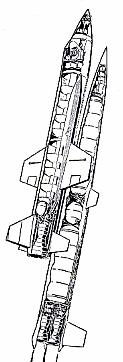One thing that would really up the strategy requirements of the USA vs. USSR campaign would be the addition of more 'dead end' type programs. By that I mean programs that don't achieve goals or improve technology necessary to put a man on the moon. That could include more variations of space probes as well as missions isolated from the technological progress system. As it stands now, there are relatively few ways for a player who is behind to make up the prestige necessary to get a healthy budget at the next review. Having a few more different types of earth satellites, lunar probes, or space plane missions to research and get the prestige first for is a way to help play catch up, without just hoping your opponent stumbles.
An example of what I mean by programs isolated from the technological progress system would be something like Project Pilot for the USA. It was a US Navy program using various off-the-shelf rockets and an aircraft to try to launch a tiny satellite. Adding something like that to SPM would force the player to make an early decision about whether to go down the 'normal' path to a satellite launch, or to take the 'easy out' of Project Pilot. Project Pilot would offer the attractiveness of being significantly cheaper (than Explorer and rocket), and requiring the R&D of only one component, which would allow the possibility for an earlier satellite launch; but would have the drawback of limited to no tech transfer to other rocket programs.
Just my suggestions to add more different ways to play the game and reach the moon first.
Chris
Suggestion for More 'Dead End' Programs
Re: Suggestion for More 'Dead End' Programs
That's an interesting idea, though the game is already featuring quite a lot of programs 
The planetary probes are definitively a kind of "non-essential". The Soviets have access to a bunch of such missions to Venus & Mars, while NASA can literally explore all the Solar System from the Sun to Saturn !
Also some manned programs are cheaper than others : if you are a bit short on budget, you'll probably try to get everything from the Voskhod playing the Soviets and prepare a Gemini Lunar Landing (EOR or DA) playing the NASA.
Maybe some advanced satellites & probes could earn a bit more prestige though.
The planetary probes are definitively a kind of "non-essential". The Soviets have access to a bunch of such missions to Venus & Mars, while NASA can literally explore all the Solar System from the Sun to Saturn !
Also some manned programs are cheaper than others : if you are a bit short on budget, you'll probably try to get everything from the Voskhod playing the Soviets and prepare a Gemini Lunar Landing (EOR or DA) playing the NASA.
Maybe some advanced satellites & probes could earn a bit more prestige though.
Nicolas Escats
Buzz Aldrin's Space Program Manager Contributor
Buzz Aldrin's Space Program Manager Contributor
Re: Suggestion for More 'Dead End' Programs
One idea would be to enhance the replayability to start to use sounding rockets, as it really was:
Sounding rockets of the United States
Sounding rockets of the Soviet Union
It also could use a Navajo missile to put in orbit an X-15, and thus balance the X-15 program with the Russian equivalent PKA

Navaho/X-15
Alternatives to X-15/PKA, Mercury/Vostok, Gemini/Voskhod be interesting (Project 7969, MORAD, Suborbital Cabin, Sever,...)
More info/ideas and cancelled programs: Your Flight Has Been Cancelled....
Sounding rockets of the United States
Sounding rockets of the Soviet Union
It also could use a Navajo missile to put in orbit an X-15, and thus balance the X-15 program with the Russian equivalent PKA

Navaho/X-15
Alternatives to X-15/PKA, Mercury/Vostok, Gemini/Voskhod be interesting (Project 7969, MORAD, Suborbital Cabin, Sever,...)
More info/ideas and cancelled programs: Your Flight Has Been Cancelled....
Re: Suggestion for More 'Dead End' Programs
I'm not disagreeing with you that there are a lot of programs. A lot of them don't come into play until later in the race to the moon (if at all in the campaign). I was just thinking of some more stuff to add in earlier. Especially if it can help prevent some of the bottlenecks. In some places, like with Explorer or Mercury, there's really only one option. So if you have a setback, you can do really nothing but wait a year until that program is researched back up. My thought is including something like Project Pilot which would be relatively quick to research (and might start by default at a higher percentage) would give you an alternate option to at least get a satellite launched before the next budget review. Players wouldn't use it on a regular basis because it wouldn't get you anywhere besides achieving the goal. There'd be no research carry over into any other probes or rockets so it wouldn't be on the 'normal' path.
I'd advocate for the inclusion of some of the X-15 add-on programs as well. Maybe something like an "X-15 Advanced Applications" program, that would include additional components you could research (so it wasn't as simple as just flying additional X-15 missions) to allow you to use the X-15 to get a man in space (X-15/Navajo) or launch a satellite (X-15/Blue Scout), etc. And by putting them in a separate program the player has to decide whether they want to spend the additional money to go down that path.
Basically, I'm not saying the game should have more programs just for the sake of more programs. I'm just advocating for more different ways to achieve the same goal. I love that you can pair any capable rocket with a payload. That gives so much flexibility to work around setbacks. If you have a couple of setbacks with Redstone, Atlas is just about ready so you might as well just use that to launch Mercury. But if you have a couple of setbacks with Mercury, you're just not going to get a man in space. Even later in the game, there are a few places where you have only one option. Like Saturn V is the only way to get Apollo to the moon.
On another note, I had a question about research. Do missions have an affect on the rate of research improvement on a program? I understand that a successful flight improves reliability and an unsuccessful flight lowers reliability. My question is about the research done after the flight. I guess the best way to explain it is by example. Say a particular set of researchers improves reliability on a particular rocket by about 3% a turn. If I have an unsuccessful flight using that rocket, it lowers the reliability 10%, but will the researchers improve the reliability by any more than the 3% a turn? I feel like there should be some benefit to flights, whether they are successful or not. A failure should obviously lower reliability, just like it does, but even an unsuccessful flight provides data and information to help the program. I don't know whether the game factors this in or not, which is why I'm asking.
Chris
I'd advocate for the inclusion of some of the X-15 add-on programs as well. Maybe something like an "X-15 Advanced Applications" program, that would include additional components you could research (so it wasn't as simple as just flying additional X-15 missions) to allow you to use the X-15 to get a man in space (X-15/Navajo) or launch a satellite (X-15/Blue Scout), etc. And by putting them in a separate program the player has to decide whether they want to spend the additional money to go down that path.
Basically, I'm not saying the game should have more programs just for the sake of more programs. I'm just advocating for more different ways to achieve the same goal. I love that you can pair any capable rocket with a payload. That gives so much flexibility to work around setbacks. If you have a couple of setbacks with Redstone, Atlas is just about ready so you might as well just use that to launch Mercury. But if you have a couple of setbacks with Mercury, you're just not going to get a man in space. Even later in the game, there are a few places where you have only one option. Like Saturn V is the only way to get Apollo to the moon.
On another note, I had a question about research. Do missions have an affect on the rate of research improvement on a program? I understand that a successful flight improves reliability and an unsuccessful flight lowers reliability. My question is about the research done after the flight. I guess the best way to explain it is by example. Say a particular set of researchers improves reliability on a particular rocket by about 3% a turn. If I have an unsuccessful flight using that rocket, it lowers the reliability 10%, but will the researchers improve the reliability by any more than the 3% a turn? I feel like there should be some benefit to flights, whether they are successful or not. A failure should obviously lower reliability, just like it does, but even an unsuccessful flight provides data and information to help the program. I don't know whether the game factors this in or not, which is why I'm asking.
Chris
Re: Suggestion for More 'Dead End' Programs
Hello,On another note, I had a question about research. Do missions have an affect on the rate of research improvement on a program?
Yes they do. When a component performs correctly during a mission (a rocket can perform perfectly and the mission can still be a failure because the spacecraft fails after the launch), it's "Max. R&D safety factor" gets a small boost. This is important, because it determines the rate of the R&D. As an example :
- For an unsafe program, that has a max R&D of say 85%, the R&D improvement rate will be calculated from those 85%. A safe program that has a max R&D of 95% will then earn a few more "R&D points" per turn. Now of course, it still takes longer to reach 95% rather than 85%. But that "Max. R&D safety factor" defintively has an impact, so researching again a "maxed up" program that failed will be a bit faster, and it is especially noticeable in the "last %" that are so hard to get.
Nicolas Escats
Buzz Aldrin's Space Program Manager Contributor
Buzz Aldrin's Space Program Manager Contributor
Re: Suggestion for More 'Dead End' Programs
Nicholas,
Thanks very much for the explanation. That all makes great sense to me. I think it might make sense to boost the max r&d safety factor even if a component fails during a mission or maybe just add in a small factor to change the R&D improvement rate based on flights. Afterall, it is possible to learn a lot from the mission failures. As of right now, test flights are really only worth it to avoid the penalties. You want to wait until the component is almost fully researched anyway before you launch a test flight since a failure is such a major setback with no upside. Just my thoughts.
Chris
Thanks very much for the explanation. That all makes great sense to me. I think it might make sense to boost the max r&d safety factor even if a component fails during a mission or maybe just add in a small factor to change the R&D improvement rate based on flights. Afterall, it is possible to learn a lot from the mission failures. As of right now, test flights are really only worth it to avoid the penalties. You want to wait until the component is almost fully researched anyway before you launch a test flight since a failure is such a major setback with no upside. Just my thoughts.
Chris




